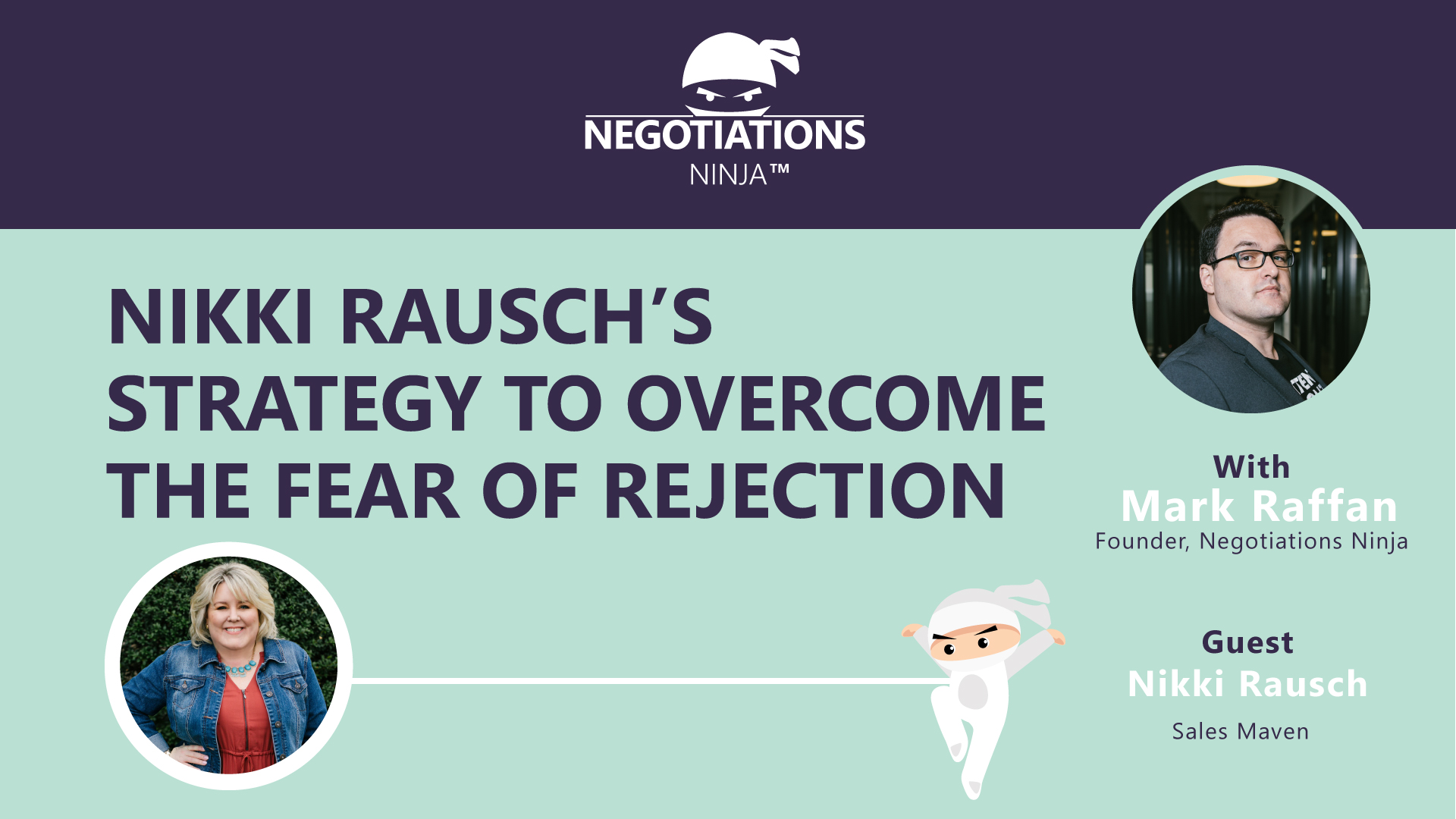Nikki Rausch “The Sales Maven” teaches salespeople how to have more effective sales conversations while maintaining rapport and keeping the relationship intact. She also teaches how to overcome the fear of rejection by fundamentally changing the way you view sales: It’s something you do with someone, not to them. Learn how to shift your mindset to overcome fear in this episode of Negotiations Ninja.
Outline of This Episode
- [1:23] Learn more about Nikki Rausch
- [1:45] Maintaining rapport while selling
- [3:14] Nikki’s strategy for overcoming rejection
- [8:21] Why stories are powerful in B2B sales
- [10:56] Salespeople are guides—not heroes
- [13:23] The importance of questions in sales
What is your sales mindset?
Many people fear that if they ask too much, a relationship will become transactional, or someone will stop working with them altogether.
Nikki points out that you need to take a step back and reframe the way you view selling. Sales isn’t something you do to somebody. Sales is something you do with people. It needs to be a collaborative experience.
Your job isn’t to convince someone to buy from you. Your job is to understand if someone has a problem, a need, or a want that your product or service can be the solution to.
You simply present what you have to offer and let the other person decide yes or no. It’s not getting something out of someone or asking too much.
- Do they have a problem, a need, or a want?
- Do you have the solution?
- Have you asked permission to share your solution, and have they given you permission?
If you’ve checked all of these boxes, lay out the offer and let them make a decision. It can and should be that simple.
How to overcome the fear of rejection
No one wants to put themselves in a position to be rejected. So people don’t initiate conversations or reach out to someone who might benefit from what they have to offer. They don’t ask for the sale.
Let’s say you have a beautiful meal at one of your favorite restaurants, and the waiter offers you a dessert menu. But you pass, stating you’re full and couldn’t possibly have dessert. The waiter doesn’t go back to the kitchen and say, “Can you believe that? I offered her dessert, and she rejected me!”
When someone turns us down, it doesn’t have to be rejection. Nikki prefers to view it as information.
Let’s reframe the situation: What if you go out and have that beautiful meal, but when the waiter comes by and clears your table, he doesn’t offer you dessert? When you leave, you feel jaded. You feel left out.
You have to open the conversation, share your problem or solution, and let the other person decide yes or no. What will they think if you don’t?
- That person doesn’t want to work with me
- They don’t think I can afford it
If none of those things are true, you’ll miss the opportunity to work with important people. They won’t be offended if you offer them an opportunity to work with you. They will be offended if you don’t. You’re better off just offering.
Always ask: “What would it take to…”
So many salespeople get so wrapped up in the fear of rejection that they don’t ask.
Nikki encourages her clients to spend time asking questions. When clients ask questions, they get information that they’re shocked people will reveal. Sometimes when you ask a question, they won’t have an answer. If they don’t know the answer, it will be hard for them to make a decision. Why? Because they don’t know what their criteria are. They don’t know what it would take to work together.
The prospect doesn’t care what you want and know. They care about whether or not you can help them get what they want or need. So if you want to get to the heart of the matter, you have to ask questions.
Questions create an opportunity for you to guide the conversation. It also allows the customer or prospect to be the expert. They’re telling you what’s important to them. It will always have more influence than what’s important to you and what you know. We need to stop entering sales conversations talking about ourselves or our companies so we don’t miss out on buying signals.
Sometimes a “no” is just a “not yet”
People take rejection personally. But a prospect isn’t saying no to you; they’re just saying no to your offer. And sometimes, a no is just a “not yet,” and they may need your product or solution down the road.
That’s why you focus on building a relationship. Nikki has example after example of people who’ve initially expressed interest but couldn’t commit right away. But when they were ready to scale their business, they came back to her.
Resources & People Mentioned
- Get Nikki’s “Closing the Sale” eBook for FREE
Connect with Nikki Rausch
- Nikki’s website
- The Sales Maven Podcast
- Connect with Nikki on LinkedIn
Connect With Mark
- Follow Negotiations Ninja on Twitter: @NegotiationPod
- Connect with Mark on LinkedIn
- Follow Negotiations Ninja on LinkedIn
- Connect on Instagram: @NegotiationPod




